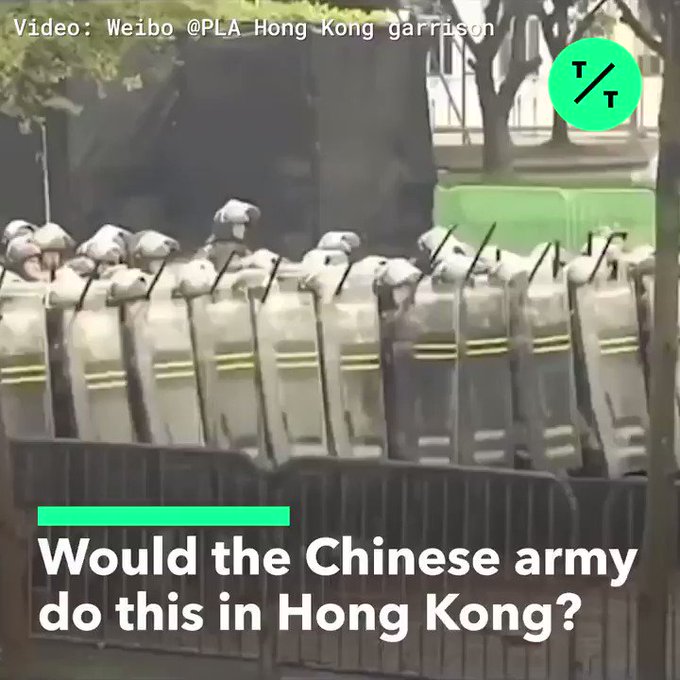How Many Chinese Soldiers Are in Hong Kong and Why
Hong Kong Protesters Shut Down Airport, Tensions Flare
After weeks of anti-government protests in Hong Kong, anxiety is growing that China might mobilize the People’s Liberation Army -- as it did 30 years ago to quash demonstrations in Beijing’s Tiananmen Square. Chinese troops have been stationed in Hong Kong since the British handed the city back to China in 1997. Chinese officials seem willing to at least feed the speculation with hints and signals, including the release of a video showing troops just across the border practicing riot-control techniques. While a military intervention seems unlikely for now given the enormous repercussions it would surely have, just the possibility has set nerves on edge.
1. How many troops are there?
An estimated 6,000 are stationed in the city at any given time, with thousands more located across the border in Shenzhen, according to Rand Corp. The PLA’s Hong Kong headquarters sits in the city’s main business district, a few steps from Bank of America Tower, and there are barracks and other sites scattered across the city.
Chinese Military in Hong Kong
The People's Liberation Army has an estimated 6,000 troops in the city
Sources: Hong Kong Legislative Council, Rand Corp.
2. What do they do?
Not much, so far. Article 14 of the Basic Law states:
“The Government of the Hong Kong Special Administrative Region may, when necessary, ask the Central People’s Government for assistance from the garrison in the maintenance of public order and in disaster relief.”
The city government has never requested a deployment. In 2018, more than 400 soldiers helped clear fallen trees following Typhoon Mangkhut, the first time they had undertaken such a role. Some residents were disquieted as the city’s government said it hadn’t asked for the help.
3. What has China said?
China has defined its red lines as: “No harm to national security, no challenge to the central government’s authority and no using Hong Kong as a base to undermine China.” The spokesman for the Hong Kong and Macau Affairs Office in Beijing, Yang Guang, has affirmed China’s support for Hong Kong leader Carrie Lam and the local police. But he also has refused to rule out a military intervention. Chinese officials and state media have ramped up claims of foreign interference, describing the U.S. as a “black hand” behind the protests -- a claim the State Department has dismissed as “ridiculous.”
4. And the PLA?
Days after protesters surrounded China’s liaison office in Hong Kong and defaced the national emblem in July, a Defense Ministry spokesman, Senior Colonel Wu Qian, spoke at a news conference:
“The behavior of some radical demonstrators, challenging the authority of the central government and touching the bottom line of the principle of ‘one country, two systems,’ is absolutely intolerable,” Wu said. “The Pearl of the Orient is not to be defiled.”
Major General Chen Daoxiang, commander of the garrison in Hong Kong, publicly condemned violent protesters and professed its backing for Lam. The same day, the garrison released a three-minute video showing PLA troops in riot gear battling mock protesters with tear gas, water cannons and armored personnel carriers. “We have the determination, confidence and capability to safeguard China’s sovereignty, security and development interests, and to safeguard Hong Kong’s long-term prosperity and stability,” the garrison wrote.
5. And Hong Kong?
A Hong Kong government spokesman said in early August that local authorities have the “full capability” to maintain public order and that there’s no need to ask China’s military for assistance.
6. What’s the fear?
The biggest is a repeat of the deadly crackdown by the PLA that took place in Tiananmen Square, in which hundreds or even thousands of people died. An alternative could be deploying the People’s Armed Police, a paramilitary force used to guard sensitive sites like Tiananmen and in the predominately Muslim western region of Xinjiang. Martial law or a state of emergency could be declared.
7. What might happen then?
Even smaller-scale intervention could spark an exodus from the city’s financial markets and prompt international companies to consider pulling out, especially if the U.S. were to withdraw Hong Kong’s special trading privileges. The economy would suffer, property prices would likely fall and Hong Kong’s cosmopolitan image would suffer major damage.
8. Wouldn’t China suffer?
China would face potential economic sanctions from the U.S. and Europe, an emboldened pro-independence movement in Taiwan and increased financial risks for companies that rely on Hong Kong as a gateway to international investors -- all while grappling with U.S. President Donald Trump’s trade war and the slowest economic expansion since foreign investment collapsed after Tiananmen.
9. What are others saying?
In early August Trump called the Hong Kong protests “riots” -- the same label used by Chinese authorities -- and suggested the U.S. would stay out “because Hong Kong is a part of China.” Hu Xijin, the editor of the Global Times, one of China’s most combative state-run newspapers, wrote in July that troops would only be deployed in extreme cases, such as a takeover of the city’s main government institutions by extremists



 Armed soldiers and water cannons
Armed soldiers and water cannons
0 Commentaires